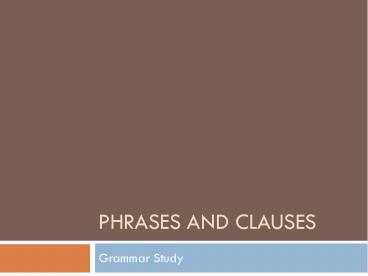Phrases and Clauses - PowerPoint PPT Presentation
Title: Phrases and Clauses
1
Phrases and Clauses
- Grammar Study
2
How are they alike?
- Both phrases and clauses are groups of words.
Because he called
Wonderful idea
The girl is nice
Great job
3
How are they DIFFERENT?
- PHRASES
- Do not have a subject and a predicate
- CLAUSES
- Have both a subject and a predicate
- Can be independent or dependent.
4
Examples of Phrases
- A walking stick
- Running outside
- Taking a walk
5
Examples of Clauses
- Students walk two tiles
- If you want to go
- School ends soon
6
Adjective and Adverbial Clauses
- Adjective and adverbial clauses are subordinate
clauses. This means they cannot stand on their
own. They depend on an independent clause to make
a grammatically correct sentence.
7
Adjective Clauses
- The adjective clause modifies nouns or pronouns
- Answers questions like What kind? or Which one?
8
Example 1
- The guitar, which was one Jimi Hendrix used to
own, was found at a garage sale. - The phrase which was one Jimi Hendrix used to
own answers the question which one.
9
Example 2
- Jeremy, who won the lottery, now lives in
Buckhead. - The phrase who won the lottery answers the
question which one.
10
Relative Pronouns
- Adjective clauses are usually introduced by
relative pronouns such as
Who Whom
Whose Whomever
Whoever Whichever
Whatever Which
That What
11
Adverb Clauses
- An adverbial clause modifies a verb, an
adjective or an adverb - Answers questions like Where? When? In what
manner? To what extent? Under what conditions or
Why?
12
Example 1
- The hostess wouldnt seat us
- because the restaurant was
- closed.
- The clause because the restaurant was closed
answers the question why.
13
Example 2
- Janet will come to the movies if you can give her
a ride. - The clause if you can give her a ride answers the
question under what condition?
14
Subordinate Conjunctions
- These words and phrases signify time, cause and
effect, opposition and condition
After although Because Before Even
If Even though In order Provided that Rather than
Since So that Unless Whenever Wherever
While Why Whether When Whereas
15
Adverbial clauses are movable
- A good way to distinguish between adjective and
adverbial clauses is to try and move the clause. - If the sentence is still grammatically correct,
then you have an adverbial clause.
16
Example 1
- The hostess wouldnt seat us because the
restaurant was closed. - Because the restaurant was closed, the hostess
wouldnt seat us.
17
Example 2
- Janet will come to the movies if you can give her
a ride. - If you can give her a ride, Janet will come to
the movies.
18
Lets Practice!
- A black hole, which results after a star had
collapsed, can trap energy and matter. - The teacher mailed the letter after she had
sealed it. - When she is ready, she will tell us what
happened. - We need a player who can score.
19
Answers
- Which results after a star has collapsed
adjective clause - After she sealed it- adverbial clause
- When she is ready- adverbial clause
- Who can score- adjective clause
20
Noun Clause
- A noun clause is a dependent clause used as a
noun. - It can be a subject, a direct object, an indirect
object, object of a preposition, or a predicate
noun.
21
Example
- What frustrates many
- physically challenged
- people is the problem of
- getting around. (subject)
22
Example
- Volunteers know that physically challenged people
do not want special treatment. (direct object)































